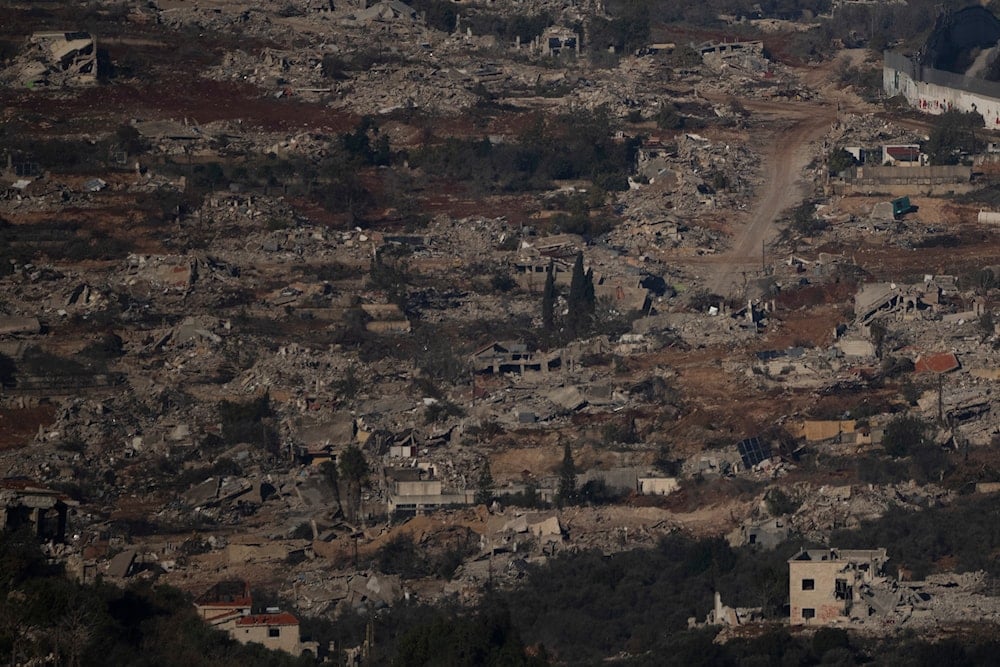US cautions 'Israel' on fragility of Lebanon ceasefire
After numerous Israeli violations of the ceasefire agreement, the US is warning "Israel" about the fragility of the ceasefire.
-

Destroyed buildings in an area of the village of Kfar Kila in southern Lebanon, located next to the Palestinian-Lebanese border, as seen from northern occupied Palestine, on December 1, 2024. (AP)
US officials say the Biden administration is worried the fragile ceasefire in Lebanon may collapse following the recent exchange of fire between "Israel" and Hezbollah, as the Resistance has retaliated to "Israel's" recurrent violations of the ceasefire.
If the ceasefire collapses, confrontations between Hezbollah and the Israeli occupation could escalate again, escalating the war in the region.
The ceasefire agreement took effect on Tuesday, ending the Israeli aggression on Lebanon.
On Monday, White House spokesperson John Kirby told reporters that the "sporadic strikes" in recent days were anticipated.
"There has been dramatic reduction in the violence. The monitoring mechanism is in full force and is working ... largely speaking the ceasefire is holding," he said. However, the administration privately expressed its concerns over the Israeli violations.
"The Israelis have been playing a dangerous game in recent days," a US official told Axios after Israeli officials said that the occupation intends to conduct a wider attack on Monday.
Israeli violations of ceasefire
The Lebanese government stated that "Israel" has violated the ceasefire more than 50 times since it came into effect last Wednesday.
In its latest breach, the Israeli occupation military carried out Monday a drone strike on a bulldozer operating near a Lebanese Army post in the village of Hosh al-Sayyed Ali, north of the Hermel district, wounding a Lebanese soldier.
The Lebanese Army announced on X that an Israeli drone targeted a bulldozer belonging to the army while it was conducting fortification work inside the military post of al-Abbara in the area of Hosh al-Sayyed Ali, resulting in moderate injuries to one soldier.
In response to the countless violations, Hezbollah responded with warning strikes, targeting the Israeli-occupied Ruwaysat al-Alam site in the Kfar Chouba hills, in southern Lebanon.
The Resistance said in its statement that it conducted the operation in response to the violations, "which have included various forms of aggression, such as firing on civilians and conducting airstrikes in different areas of Lebanon—resulting in the martyrdom of civilians and injuries to others—and the continued breach of Lebanese airspace by enemy aircraft, even reaching the capital Beirut."
In response, Israeli Minister of Security Israel Katz said "Israel" is committed to countering any ceasefire violations by Hezbollah and emphasized that the mortar attack "will be met with a harsh response."
Behind closed doors
It is worth mentioning that US officials noted that President Biden's advisor, Amos Hochstein, who brokered the ceasefire, spoke with Israeli officials over the weekend, expressing concern about their continued strikes in Lebanon. He urged the Israelis to allow the ceasefire monitoring mechanism to begin functioning, according to the officials.
An Israeli official said Hochstein expressed concerns that "Israel" is enforcing the ceasefire "too aggressively."
The official acknowledged that the current situation could lead to the collapse of the ceasefire, but emphasized that its outcome would depend on how Hezbollah reacts to the Israeli response to Monday's warning strike.
It is worth noting that US General Jasper Jeffers arrived in Beirut last week to serve as the military co-chair for the implementation and monitoring mechanism, according to a statement from CENTCOM. The mechanism is expected to involve French military officers, in addition to representatives from the Lebanese Armed Forces, the IOF, and UNIFIL.
That said, Israeli Minister of Strategic Affairs Ron Dermer is set to meet with Secretary of State Antony Blinken on Monday in Washington, D.C.

 4 Min Read
4 Min Read








